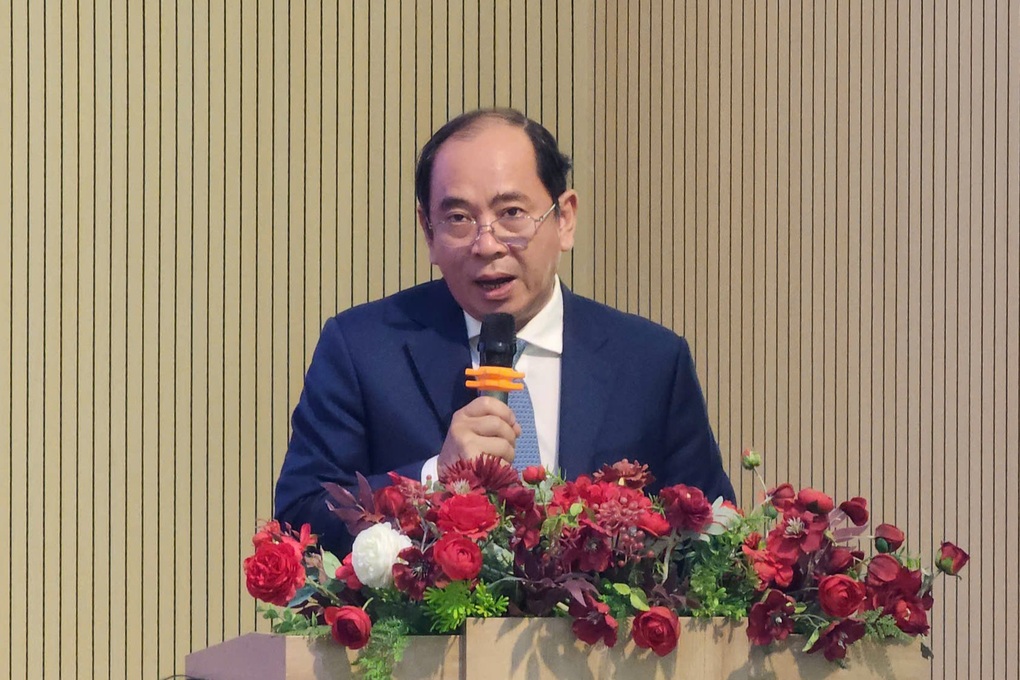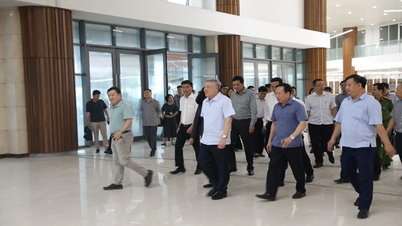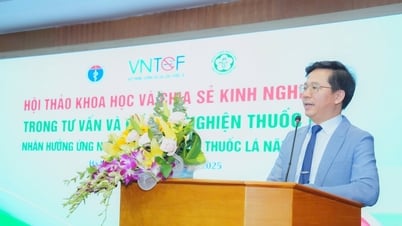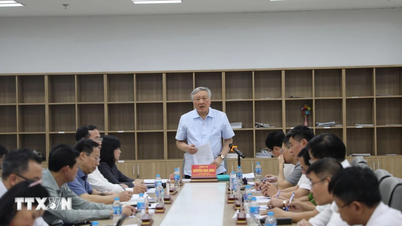The comments were made by experts at the International Conference on Artificial Intelligence (AI) in Healthcare organized by the Ho Chi Minh City Department of Health in 2025 on May 23.
AI cannot replace doctors
Speaking at the event, Associate Professor, Dr. Tang Chi Thuong - Director of the Ho Chi Minh City Department of Health - affirmed that the city has clearly identified the central role of AI in the smart healthcare strategy for the period 2021-2025 and vision to 2030.
"AI does not replace humans but is an intelligent support tool, helping doctors and managers improve professional quality, optimize processes and improve patient experience," said Mr. Thuong.

Associate Professor, Dr. Tang Chi Thuong - Director of Ho Chi Minh City Department of Health (Photo: D. Linh).
Ho Chi Minh City is implementing a series of pilot projects to apply AI in diagnostic imaging, hospital management and support personalized treatment. One of the top priorities is to complete health records and electronic medical records - an important foundation for effective AI implementation.
The Director of the Ho Chi Minh City Department of Health emphasized that the Ho Chi Minh City health sector is accelerating to complete these systems before the September 2025 deadline as directed by the Prime Minister .
Speaking at the conference, Ms. Angela Pratt - Chief Representative of the World Health Organization (WHO) in Vietnam - warned that AI technology is not only an opportunity, but also poses many risks if not strictly controlled.
“Like any new technology, AI has enormous potential to improve the health of millions of people. But like any technology, it can be misused and have negative impacts,” she quoted WHO Director-General Tedros Adhanom Ghebreyesus as saying.
Two challenges when applying AI in healthcare
According to Ms. Angela, the application of AI in the healthcare industry faces two biggest challenges today.
The first challenge is that gaps in access to technology can exacerbate health inequities.
Many countries such as South Korea and Singapore have quickly applied AI in healthcare. However, in areas where people are still poor and digital infrastructure is weak, access to AI is almost impossible.
"For example, facial recognition software that measures blood pressure and heart rate via phone has great potential, but cannot be effective if the patient does not have the device or the skills to use it," said Ms. Angela.
According to the WHO representative, Vietnam needs to avoid a situation where AI only benefits a certain group of people, increasing inequality in access to healthcare among people.
Ms. Angela emphasized that Vietnam needs to promote digital skills training for its people and ensure that AI technology reaches those in need, thereby turning risks into opportunities to improve the quality of health care for all people. To illustrate this point, she shared two specific examples from the Philippines and Thailand.
In the Philippines - a country of more than 7,000 islands, medical staff are using AI to diagnose TB in risk groups, helping with faster detection and more effective treatment monitoring.
In Thailand, an AI-based stroke risk assessment app has helped doctors at primary hospitals – where there is a shortage of cardiologists – make faster and more accurate diagnoses. In stroke treatment, every minute and hour can save a patient’s life or prevent future disability.

AI helps doctors in Thailand diagnose and treat strokes (Illustration: Getty).
The second risk is data security. According to WHO, without good measures to protect personal data, people will gradually lose trust in digital technology. Trust is a prerequisite for technology to become popular.
WHO recommends that Vietnam build a clear legal framework to ensure AI is deployed safely, ethically and fairly.
To do this, the health sector needs to listen to the voices of patients, health workers, policymakers, businesses and stakeholders.
As for WHO, Ms. Angela said that the organization will support the government in developing guidelines, legal frameworks, and cooperation plans to ensure AI is effectively applied in healthcare.
From international experience, WHO representatives made 6 key recommendations for applying AI in the healthcare sector.
First, build trust by being open and transparent about how AI is developed and its applications in medicine.
Second, closely monitor AI in diagnosing and treating patients, to avoid cases where AI gives health advice that causes serious consequences.
Third , AI needs to be trained on diverse data sources, while still ensuring the security of personal data.
Fourth , even the most advanced AI technologies must be guided by humans. All decisions regarding patient care must ultimately be made by healthcare workers.
Fifth, data systems must be connected and supported by robust network infrastructure.
Sixth, the development of AI in healthcare requires the participation of patients, healthcare workers, regulators, businesses and technology developers to ensure a sustainable and appropriate legal framework.
Source: https://dantri.com.vn/suc-khoe/dai-dien-who-tai-viet-nam-hai-thach-thuc-lon-khi-ap-dung-ai-trong-y-te-20250523142607324.htm


![[Photo] Top players gather at the 2025 Nhan Dan Newspaper National Table Tennis Championship](https://vphoto.vietnam.vn/thumb/1200x675/vietnam/resource/IMAGE/2025/5/23/9ad5f6f4faf146b08335e5c446edb107)

























































































Comment (0)